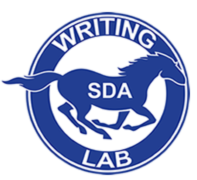You have a prompt and a due date. You’ve got a thesis that you feel you can write about (or maybe just one that your teacher has approved). You’ve gathered your quote evidence, but when asked to analyze that evidence – ideally the meat of your essay – you’ve got nothing.
Even worse, you’ve included analysis after the quote, but someone editing told you to put more in… …blerg…
Very rarely is someone born an amazing writer. Most often we gather a set of tools, over years of experience and schooling, that can be applied to different situations. When it comes to quote analysis, these are the tools I return to again and again, for both literary and stylistic analysis. (Again, these are my opinions based on my personal experiences. If your teacher has a specific method or expectation then always go with what they say)
In my experience, it’s helps to imagine my reader as a computer. They know the events of the book, but then need the emotional and stylistic effects to be explained to them. Most importantly, because they’re a computer that explanation needs to be simple, logical, and clearly stated. Generally speaking, in analysis I try to explain:
What is happening in the quote evidence: this can be the actions taken by characters or the stylistic choices made by the author to convey that action. Tell your reader what you want them to see in the quote in general.
What are the important effects (on the characters or on the reader): Narrow down and describe the evidence you want to call attention to. Explain to the reader why specific character actions are notable or different that what you might expect, and what those actions say about how the character feels. When discussing style, describe the effect that an author’s choice has on the reader, and the way a piece is conveyed or read.
and finally, How does the evidence you’ve provided relate to or show your theme/thesis: This is where you connect the character or reader’s emotional response (that you described before) to your overall argument, your theme or thesis. This will probably be the longest part of your analysis, and may take a few sentences to cover. This is the section where you really have to remember to keep things logical and clear (for your computer-reader friend)
These questions are not meant to be a solution to every analysis problem. However they have been an extremely handy tool in my writing arsenal. In answering them I have often realized that I have much more to say about a quote than I first thought, and – though length requirements shouldn’t be your first thought when writing – I have been able to add quality length to a too-short essay (instead of just “fluff”).
It’s not a perfect solution, but these questions have often helped me to create at least a rough draft even when I felt there was nothing to write about. Hopefully it can do the same for you.
-L
